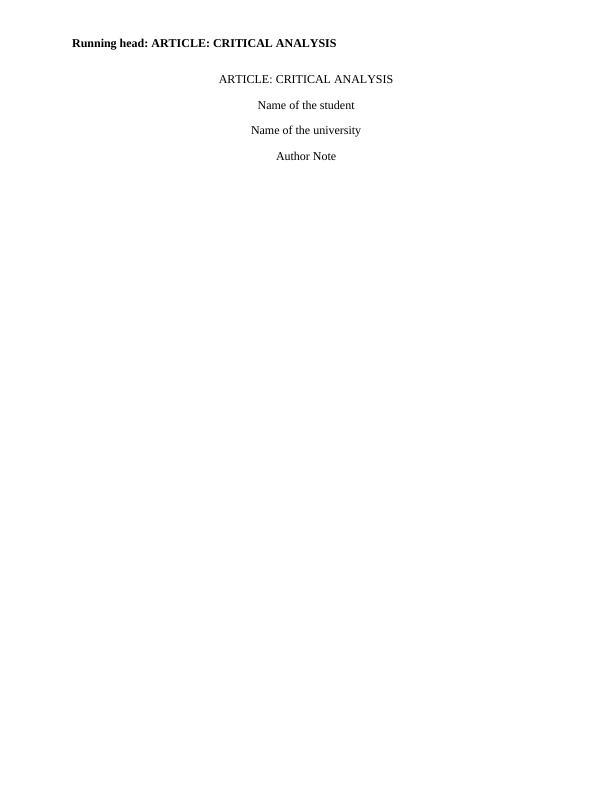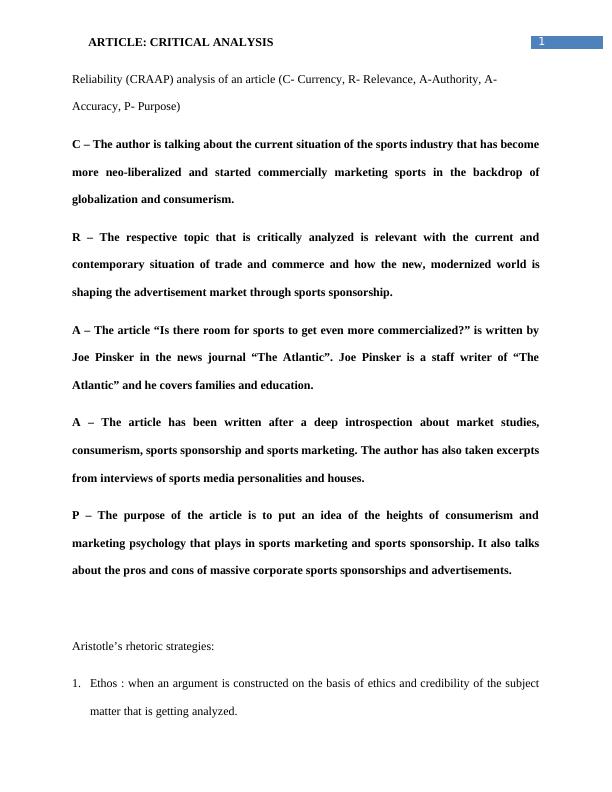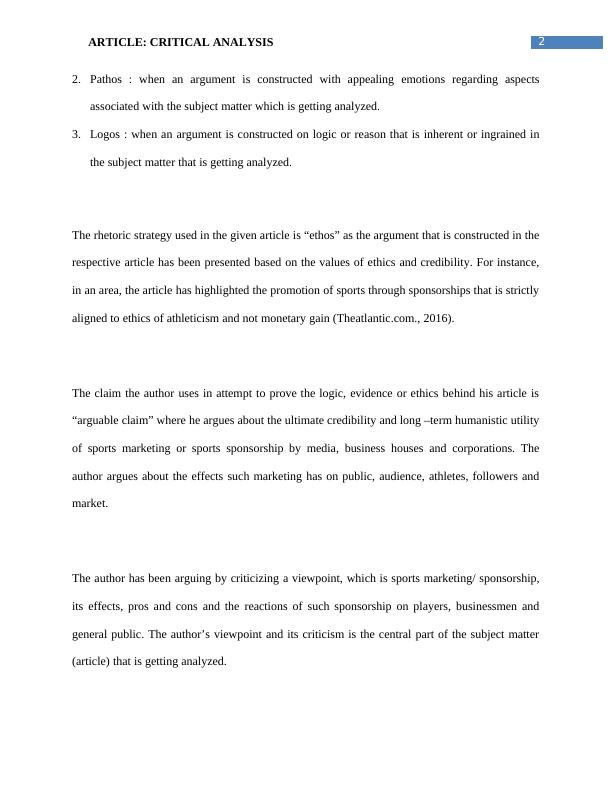Author Note Reliability Analysis of an Article (C- Currency, R- Relevance, A-Authority, A- Accuracy, P- Purpose)
Added on 2022-08-17
6 Pages1058 Words252 Views
Running head: ARTICLE: CRITICAL ANALYSIS
ARTICLE: CRITICAL ANALYSIS
Name of the student
Name of the university
Author Note
ARTICLE: CRITICAL ANALYSIS
Name of the student
Name of the university
Author Note

1ARTICLE: CRITICAL ANALYSIS
Reliability (CRAAP) analysis of an article (C- Currency, R- Relevance, A-Authority, A-
Accuracy, P- Purpose)
C – The author is talking about the current situation of the sports industry that has become
more neo-liberalized and started commercially marketing sports in the backdrop of
globalization and consumerism.
R – The respective topic that is critically analyzed is relevant with the current and
contemporary situation of trade and commerce and how the new, modernized world is
shaping the advertisement market through sports sponsorship.
A – The article “Is there room for sports to get even more commercialized?” is written by
Joe Pinsker in the news journal “The Atlantic”. Joe Pinsker is a staff writer of “The
Atlantic” and he covers families and education.
A – The article has been written after a deep introspection about market studies,
consumerism, sports sponsorship and sports marketing. The author has also taken excerpts
from interviews of sports media personalities and houses.
P – The purpose of the article is to put an idea of the heights of consumerism and
marketing psychology that plays in sports marketing and sports sponsorship. It also talks
about the pros and cons of massive corporate sports sponsorships and advertisements.
Aristotle’s rhetoric strategies:
1. Ethos : when an argument is constructed on the basis of ethics and credibility of the subject
matter that is getting analyzed.
Reliability (CRAAP) analysis of an article (C- Currency, R- Relevance, A-Authority, A-
Accuracy, P- Purpose)
C – The author is talking about the current situation of the sports industry that has become
more neo-liberalized and started commercially marketing sports in the backdrop of
globalization and consumerism.
R – The respective topic that is critically analyzed is relevant with the current and
contemporary situation of trade and commerce and how the new, modernized world is
shaping the advertisement market through sports sponsorship.
A – The article “Is there room for sports to get even more commercialized?” is written by
Joe Pinsker in the news journal “The Atlantic”. Joe Pinsker is a staff writer of “The
Atlantic” and he covers families and education.
A – The article has been written after a deep introspection about market studies,
consumerism, sports sponsorship and sports marketing. The author has also taken excerpts
from interviews of sports media personalities and houses.
P – The purpose of the article is to put an idea of the heights of consumerism and
marketing psychology that plays in sports marketing and sports sponsorship. It also talks
about the pros and cons of massive corporate sports sponsorships and advertisements.
Aristotle’s rhetoric strategies:
1. Ethos : when an argument is constructed on the basis of ethics and credibility of the subject
matter that is getting analyzed.

2ARTICLE: CRITICAL ANALYSIS
2. Pathos : when an argument is constructed with appealing emotions regarding aspects
associated with the subject matter which is getting analyzed.
3. Logos : when an argument is constructed on logic or reason that is inherent or ingrained in
the subject matter that is getting analyzed.
The rhetoric strategy used in the given article is “ethos” as the argument that is constructed in the
respective article has been presented based on the values of ethics and credibility. For instance,
in an area, the article has highlighted the promotion of sports through sponsorships that is strictly
aligned to ethics of athleticism and not monetary gain (Theatlantic.com., 2016).
The claim the author uses in attempt to prove the logic, evidence or ethics behind his article is
“arguable claim” where he argues about the ultimate credibility and long –term humanistic utility
of sports marketing or sports sponsorship by media, business houses and corporations. The
author argues about the effects such marketing has on public, audience, athletes, followers and
market.
The author has been arguing by criticizing a viewpoint, which is sports marketing/ sponsorship,
its effects, pros and cons and the reactions of such sponsorship on players, businessmen and
general public. The author’s viewpoint and its criticism is the central part of the subject matter
(article) that is getting analyzed.
2. Pathos : when an argument is constructed with appealing emotions regarding aspects
associated with the subject matter which is getting analyzed.
3. Logos : when an argument is constructed on logic or reason that is inherent or ingrained in
the subject matter that is getting analyzed.
The rhetoric strategy used in the given article is “ethos” as the argument that is constructed in the
respective article has been presented based on the values of ethics and credibility. For instance,
in an area, the article has highlighted the promotion of sports through sponsorships that is strictly
aligned to ethics of athleticism and not monetary gain (Theatlantic.com., 2016).
The claim the author uses in attempt to prove the logic, evidence or ethics behind his article is
“arguable claim” where he argues about the ultimate credibility and long –term humanistic utility
of sports marketing or sports sponsorship by media, business houses and corporations. The
author argues about the effects such marketing has on public, audience, athletes, followers and
market.
The author has been arguing by criticizing a viewpoint, which is sports marketing/ sponsorship,
its effects, pros and cons and the reactions of such sponsorship on players, businessmen and
general public. The author’s viewpoint and its criticism is the central part of the subject matter
(article) that is getting analyzed.

End of preview
Want to access all the pages? Upload your documents or become a member.
Related Documents
Critical Analysis: The Art of Argumentlg...
|8
|3548
|13